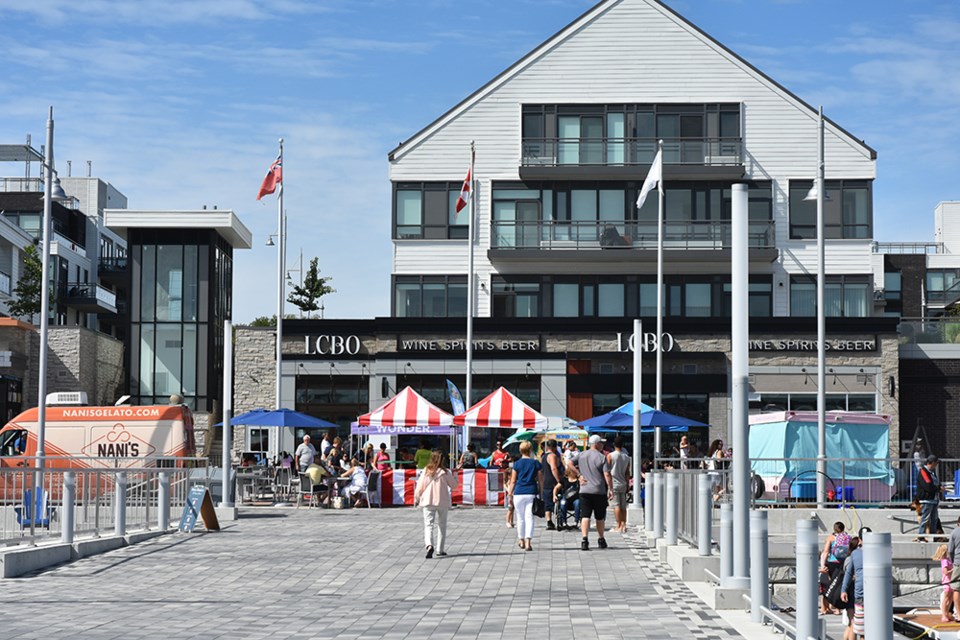In early talks around Friday Harbour Resort, Innisfil councillors worried that, once approvals were granted, the developer might abandon plans for a resort-style project and instead build a standard subdivision on the land at the end of Big Bay Point Road.
In part to ensure that the developer would deliver a “resort community,” the bylaw for Friday Harbour slapped non-permanent occupancy restrictions on the 2,600 condominium and townhome units to be built.
Under those restrictions, buyers can only occupy their units for 185 consecutive days and must then vacate the property for a 65-day period, or two periods of 35 days each.
The maximum occupancy per unit is 300 out of 365 days.
With 1,000 units now sold, more under construction and the resort community becoming well-established, five condominium corporations have now petitioned the resort association to seek a minor variance that would lift the occupancy restrictions.
“Our unit owners and their immediate families have long suffered and complained of the pains of having occupancy restrictions inhibit their use and enjoyment of their Friday Harbour Resort units and all the resort has to offer,” according to the application to Innisfil’s committee of adjustment.
The application also noted that, with units selling for up to $1 million or more, the restriction “inhibits sales and market values,” can make it difficult to secure mortgage financing, and impedes “the resort’s ability to deliver its full potential tourism and economic benefits.”
So far, approximately $750 million has been invested in the Friday Harbour Resort project, its 1,000-slip marina, 18-hole golf course, retail and other amenities.
By the time the resort is fully built out, the total investment is expected to top $2 billion and include a 400-unit hotel, conference centre and theatre.
Friday Harbour is already recognized as a four-season resort.
The applicant asks that “restricted occupancy” be deleted from the bylaw and that “four seasons” be substituted for “non-permanent” residency, especially since “the provincial Act does not require that the resort lands be occupied on a non-permanent basis.”
The change in occupancy terms would still maintain the general intent and purposes of both the Official Plan and zoning bylaw, presenting “no change to land use, no change to potential capacity utilization and no impacts on the town infrastructure and services," according to the application.
However, moving from a maximum occupancy of 300 days per unit per year to 365 days could potentially increase water and wastewater demand by more than 20 per cent if every owner took advantage of the opportunity.
Calling that the “worst-case” scenario, Innisfil development leader Nick Skerratt noted the application is still being circulated to internal and external agencies and departments for their input, including InnPower, the municipal corporation that handles the town’s sewer and water servicing.
“Everybody within that circulation has the ability to comment,” Skerratt said, suggesting that InnPower “will be reviewing those flows and infrastructure.”
In early talks about Friday Harbour, there was a suggestion that, as a resort community, it might be exempt from paying education development charges or levies.
Skerratt said that while the development charges (DC) bylaw does provide for some exemptions – for example, for places of worship – Friday Harbour has not been exempt and has paid all municipal, Simcoe County and education DCs.
“It is not identified within that bylaw that Friday Harbour has any of those exemptions,” he said. “They are subject to pay those in even a resort community.”
The application states that Friday Harbour has paid $33 million in DCs to the town, county and school boards to date, and generates $20 million annually in property taxes paid to the town and county, as well as the province for education.
“Friday Harbour isn’t complete. There’s a lot of development still to happen,” said Skerratt.
And, he added, when it does proceed, the developers will pay all appropriate DCs at the current rate.
The committee of adjustment currently meets via a monthly conference call during the ongoing COVID-19 pandemic.
The Friday Harbour application was initially scheduled to be heard on June 18, but has been deferred until July 16. More information can be found by clicking here.
If turned down by the committee of adjustment, the applicants can appeal to the Local Planning Appeal Tribunal (LPAT), the body that has replaced the Ontario Municipal Board, as the final arbiter in planning matters.



